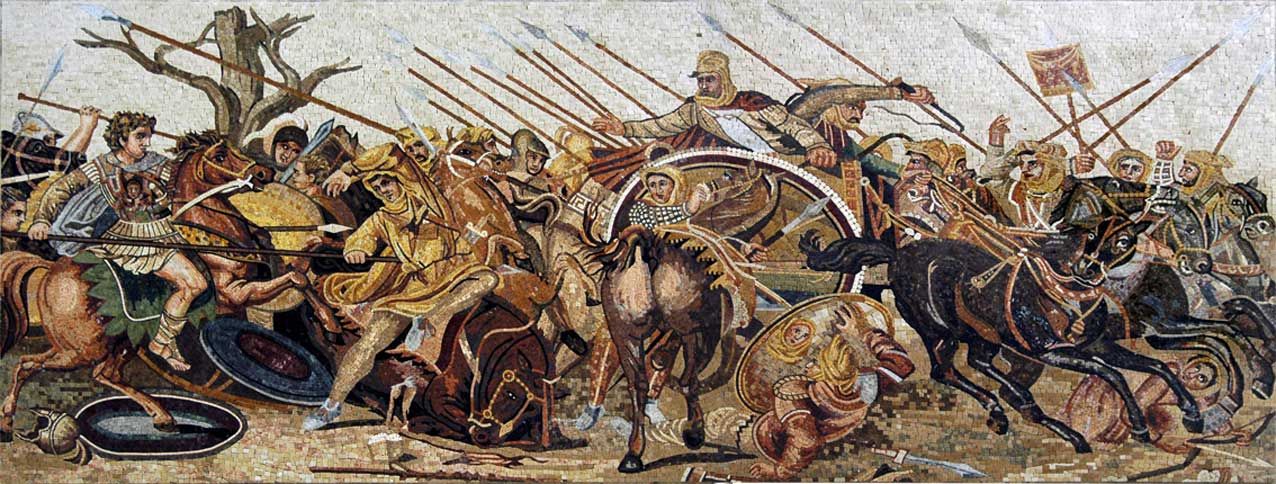
We all know about Alexander III, arguably the greatest military genius of all times. His military tactics and success on the battlefield earned him the title, “Alexander the Great.” Riding on his genius mind, the Macedonian Emperor spent his 15-year-conquest to unite the East with the West through military force and cultural exchange. However, due to the numerous anecdotes told about him through the years, it has become very difficult to actually separate fact from fiction. There are some stories that portray him as being almost godlike, while others portray him as a heartless conqueror. But, there are some historical evidences which can help us paint a proper picture of the so-called “cruel conqueror”. So, without losing any time, here are some facts backed by historical evidences about Alexander III of Macedonia.
He was taught by Aristotle
Yes, this is legit. Aristotle the great philosopher, student of Plato (student of Socrates), was hired by Philip II to educate Alexander, when he was 13. Unfortunately, little is known on what he learned from his tutelage, as most of the historical texts have been lost and the remaining ones have been interpreted in many different ways. There are evidences of Alexander sending back plant and animal specimen to Aristotle, during his conquests. So, it can be assumed that the Greek philosopher taught him Biology. However, there are many letter exchanges between the two which cover varied topics starting from Economics, Politics, Physics, Metaphysics and even Philosophy. So, did Aristotle teach him all those subjects, or just one of them, that question is still up in the air.
He was unbeaten in his conquest
This is why, they still teach his military tactics and strategies even today in many military academies throughout the world. There is absolutely no historical evidence that points to his losses in any of his expeditions. During that time, most war strategies involved the infantry at the front, followed by the cavalry the marksmen and finally the commander and his generals. Alexander had come up with a strategy to deceive and break this formation. He used small troops as baits for the infantry and cavalry, luring them out and then killing them off with marksman, whatever was left of the opposing army would then be torn apart by his army. Oh and just so you know, his army consisted of more than 48,000 soldiers ― 43,000 infantry and about 5,500 cavalry. Poor Persians!
He had “daddy issues”
Well, this is the part where things get pretty dark with Alexander. He never had the best relationship with his father. But things got strained when Philip II announced that he wanted to marry Cleopatra (no, not the Cleopatra), who he later renamed as Eurydice, the niece of Attalus. This put a question mark on Alexander’s inheritance. To add salt to the injury, he got Alexander’s only full sibling and his daughter, Cleopatra (yes, he had a daughter of the same name) married to her Uncle Alexander I or Epirus and put Alexander on house arrest. These chain events enraged both Alexander III of Macedonia and his mother, Olympias. As a result after Philip II and Caranus (his son with Eurydice) were assassinated, many people doubted Alexander and Olympias to have been the main conspirators. However, there were no evidences that proved this claim.
He had heterochromia and was rather short
Greek historian Arian of Nicomedia described Alexander to be, “The strong, handsome commander with one as dark as the night and one blue as the sky.” British historian Peter Green described Alexander as being short for Macedonian standards, he also claimed that he had one blue eye and one brown eye. Out of all the statues present of Alexander, the ones by the sculptor Lysippos is considered to be the best. According to Greek biographer and philosopher Plutarch, Alexander himself had praised Lysippos for his statues as they portrayed him perfectly. While, most sculptors wanted to make him look godlike, Lysippos depicted him exactly as he was; short, a slightly twisted neck and the melting glance of his eyes. Even to this date, his depiction of Alexander is considered to be the most accurate ones.
He was an alcoholic
Well, here comes the problem, which according to many theories, caused his death at the age of 32, he loved to booze. Yes, you read that right. Alexander the Great, the greatest military tactician of all times, the one who never lost a battle in his entire life, might have lost the war to alcohol. Greek biographers differ on many things regarding Alexander, the one thing they all agree is his drinking habit. According to Plutarch, even as a Prince, Alexander used to be drunk most of the times. When he became the king, this habit elevated to the point where he used to wake up every day with a glass of wine in his hands. Yes, it was that bad. Some anecdotes even describe that he was too drunk to even stand when he was talking to King Porus, during his Indian conquest.
There you have it folks, our attempt to bring to you some historically proven facts about Alexander. Whether it is the mystery surrounding his death, his brilliance in the battlefield, his lifestyle, or his ambitions, Alexander III of Macedonia is going to remain one of the most prominent figures in the history of the world. There are several legends, anecdotes, stories and romances told about him, which have been spread out through centuries via several sources. Some depict him as a hero and some depict him as a villain. Was he any of them or was he a little bit of both? Maybe we will never know or maybe it doesn’t matter, after all when the curtain falls and the smokes clear, we all get to see that a villain is just a hero from the other side.




